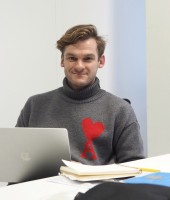Andrei Zavadski
Andrei Zavadski works at intersections of memory studies, public history, media studies, and museum studies, with a focus on Eastern Europe. He is a research associate at the Institute of Art and Material Culture, TU Dortmund University, Germany. He is also an associate member of the Centre for Anthropological Research on Museums and Heritage (CARMAH), Humboldt-Universität zu Berlin; a member of the Memory Studies Association.
Research Interests
Media and memory, memory cultures, memory museums, participation, postcolonial studies, postsocialist studies, public history, memory studies, postsocialist transitions
Reconstituting Publics through Remembering Transitions: Facilitating Critical Engagement with the 1980-90s on Local and Transnational Scales
(collaborative project, awarded a NetIAS Constructive Advanced Thinking grant, 2021-2024)
Three decades after the radical transformations of the USSR and its satellites began in the 1980s––1990s, the topic of ‘transitioning’ from socialist states to liberal democracies remains highly contentious in Central and Eastern Europe. Over the last decade, the transitional past has been increasingly instrumentalized, by national-populist actors and in the counter-memories of their opponents. In the context of heated contestations of memory, with high political stakes, spaces for dialogue are rapidly shrinking and public spheres are becoming increasingly ‘disconnected.’
The project addresses this societal issue by engaging with memory practices of the ‘transitional period’ beyond the polarized versions. Drawing on approaches of cultural analysis of discourse and affect, critical memory studies, public history, ethnography, and intersectional study of gender and generations, we aim to develop strategies for facilitating more cohesive and at the same time more critical practices of remembering that have the potential to lead to dialogue and form reflective communities. The comparative approach will allow for developing strategies that can be used by museums and cultural organizations on a transnational (European) level based on trans-local resonances rather than top-down scripts.
The participation of the NGO Transition Dialogue, Berlin, and collaboration with museums in Poland and Germany will facilitate the execution of empirical research and its translation into concrete recommendations.
Key Publications
Zavadski, Andrei (2023) ‘Remembering the 1990s in Russia as a Form of Political Protest: Mnemonic Counterpublics', in Robbe, Ksenia (ed.) Remembering Transitions: Local Revisions and Global Crossings in Culture and Media. Berlin: De Gruyter.
Zavadski, Andrei (2020) Mnemonic Counterpublics: Challenging the Political Regime in Russia with Memories of the 1990s (unpublished doctoral dissertation), Berlin: Freie Universität Berlin.
Latest Publication
Robbe, Ksenia, and Andrei Zavadski (2023) “‘C’mon, Turn Swan Lake on’: Memories of the 1990s at the Belarusian Protests of 2020″. Digital Icons: Studies in Russian, Eurasian and Eastern European New Media 22: 115–141.
|
|
|
|
|
|

